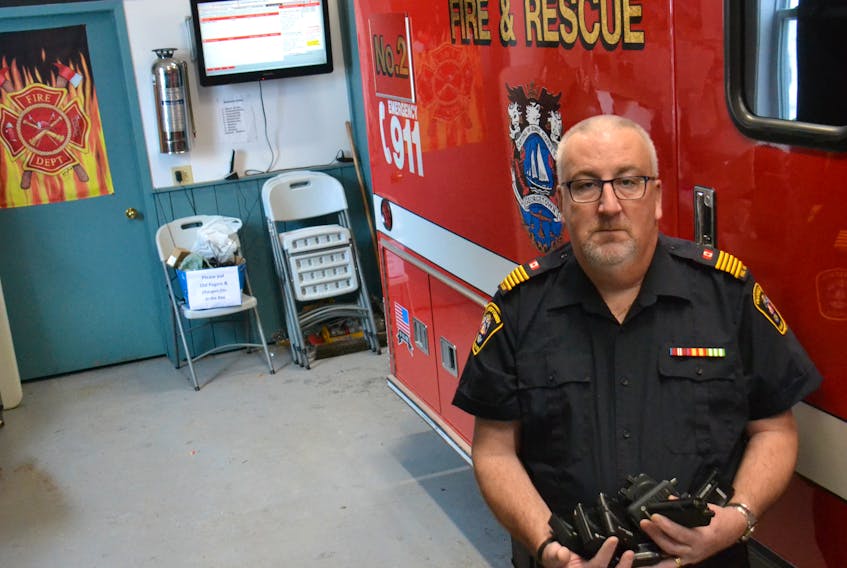One year after Bell Aliant announced it would discontinue an Island-wide pager system used by rural fire departments across P.E.I., departments have opted for a patchwork of limited-reach pager systems as a replacement.
Last July, Bell Aliant phased-out the paging system used by 13 fire departments to summon volunteer firefighters during emergencies. Departments were given written notice of the phase-out in January 2019, but most had not budgeted for a replacement. Since July, these departments have resorted to an unreliable cellular-based app, IamResponding, to call in volunteers during emergencies.
The IamResponding app was designed to supplement dispatch systems, not replace them. Cellphone tower infrastructure can be an unreliable way to reach volunteers.
An example of this occurred in late August, after a fire broke out at the East Isle Shipyard in Georgetown.
“I rounded the corner and there was nothing but black smoke,” Georgetown Fire Chief Mark Gotell told The Guardian.
Gotell said he immediately issued a text dispatch on the IamResponding App. But his volunteers received the message sporadically. Five showed up at once, others arrived 15 minutes later.
“We were 30 minutes later, we had guys who were still showing up for a call,” Gotell said.
“Time is of the essence. That’s why we do what we do.”
The loss of cell signal after last fall’s post-tropical storm Dorian could be further evidence of the pitfalls of relying on LTE signals for first responders. Although Gotell had access to the Provincial Integrated Communications System II (PICS II) radio system used by emergency services province-wide, volunteers cannot be reached from their homes or places of work using this system.
"Talk about putting people's lives in danger. Before Dorian, this should have been resolved," Gotell said.
Bell has said the pager phase-out occurred because the system was older and that most users rely on a cell-based service.
Justice and Public Safety Minister Bloyce Thompson said staff of his department met with Bell last spring.
"When the service no longer could be guaranteed, Bell wasn't about to take any liability on," Thompson said.
E-mails obtained through a Freedom of Information request show that staff with the Department of Justice and Public Safety spoke of the issue as being the responsibility of municipal fire departments.
“The incurred costs, estimated at $15,000-$20,000 for the pager replacements are like any other piece of equipment required by a fire department, and are incurred by the service,” read a June 2019 briefing by Justice and Public Safety staff.

The briefing included an “unsolicited, informal estimate” of $1-2 million for a province-wide replacement of the Bell system.
Another e-mail sent on May 16 from Aaron Campbell, director of public safety, said some departments were working on solutions while others were “waiting for a ‘provincial’ solution to be implemented.”
“As this is not a uniform Island wide issue, we have not endorsed an approach of that magnitude,” Campbell said in the e-mail.
In the end, the province’s Department of Fisheries and Communities would provide funding for the applications for pager service replacements from individual departments.
As of January, Fisheries and Communities has approved funding to pay for half the cost of new paging system for 6 of the 13 departments, including Georgetown. A total of $162,681 has so far been approved. Four other departments have submitted applications for a combined total of $90,000.
But interoperability between regions will be limited. Three companies have secured contracts for the replacement pager networks.
Fisheries and Communities Minister Jamie Fox said each department has different needs. The topography of fire coverage areas can vary, and some have been able to place their local repeaters on municipal water towers. Some are able to afford a generator, while others are not.
Fox said community fire departments will be able to call for assistance from other departments using the PICS II radio.
"It's up to the volunteers to let the fire department know if they can respond or if they cannot. So, the pager system is basically a back-up for some departments that have the IamResponding app," Fox said.
The 13 fire departments affected by the discontinued pager system are:
- East River,
- Georgetown
- North Shore
- Central Kings
- Vernon River,
- New London
- Crapaud
- Kinkora,
- Borden-Carleton
- North Rustico
- New Glasgow
- North River
- Victoria.
The 26 remaining fire departments in P.E.I. have their own VHF radio-based system.
In July, 15 fire departments briefly considered a proposal by Daniel Mullen of Island Telecom Services to pool the funding available from the Province in order to finance the development of a province-wide system.
But Mullen said he had to pull away from his own proposal due partly to an illness in his family, and partly due to what he said was unfavourable financing options offered by the province.
“The province was really cold about this,” Mullen said.
Gotell said he simply stopped hearing from Mullen and that he “just fell off the face of the earth."
Jason Blackman, North Shore Fire Department chief, said an Island-wide system would ensure volunteers could be reached when needed.
“We're restricted within our own systems to the actual range that those pages are going to be put out to," Blackman said.
A bite out the budget
Even with the funding support from the province, Gotell said the new system has taken a bite out the budget of the Georgetown Fire Department.
He has a box full of pagers, which he said cost his department $550 apiece, that are effectively useless.
“This year I suppose that's meant that we didn't purchase any additional equipment," Gotell said.
Gotell also said he is concerned that Bell Aliant currently owns the infrastructure that supports the PICS II radio system. He said the infrastructure, including towers, was owned by the province but was sold in 2015.
He said a paging layer on the PICS II radio system was initially considered.
"Bell was not interested in entertaining that,” he said.
In 2015, the province signed a ten-year contract with Bell Mobility Inc. related to the PICS radio network. A total of 13.3 acres of land, spread over six communities, was transferred from the Province to Bell. Gotell believes this may have been the locations of communications towers.
“Why do they own a public service system?" Gotell asked.
A statement from Bell Aliant emphasized their push-to-talk radio service, which they said was available over a dedicated cell-based network that would ensure "security and reliability."
"The service is available on Bell’s advanced LTE network that reaches more than 99% of Canadians," the statement read.









